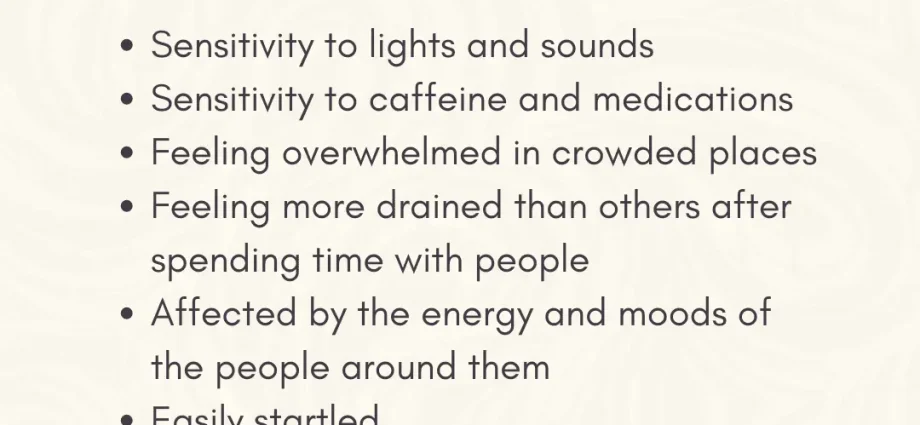Is it possible to become less receptive and is it necessary? Will vulnerable and calm partners get along together? Our questions are answered by an emotionally focused and systemic family therapist.
What is the difference between vulnerability and sensitivity?
Natalia Litvinova: Sensitivity is how we perceive events from life, vulnerability — when we feel ourselves the cause of them. Suppose you said something unpleasant to your interlocutor. A vulnerable character will argue like this: it means it’s because of me. So it’s my fault. He does not admit that you, for example, are in a bad mood. He doesn’t ask himself if you have the right to talk to him in that tone at all. He immediately takes everything into his own account.
Do sensitive people find life easier with the same partners, or do you need someone thicker and more balanced to balance?
Everything is ambiguous here. The interaction of similar personality types has bonuses: such partners feel each other better, treat each other more reverently and attentively, accurate in words and deeds. They imagine in what cases it hurts them, and therefore they do not want to hurt their partner.
On the other hand, when communicating, it is still better to have different levels of reaction.
The one who reacts to things more calmly can serve as an example for the one whose reaction to what is happening is painful. Through these observations, a sensitive partner may think that there is an alternative to his experiences, and over time begin to choose it.
Another plus is manifested in the event of an unforeseen situation. A couple is more likely to deal with it if, while one is panicking, the other makes an informed decision. But there are also disadvantages: a less sensitive partner may simply not understand the level of the other’s experiences.
What determines the level of sensitivity?
The excitability of the nervous system is a quality that is “given” to us at birth. The level of sensitivity is certainly influenced by the environment in which we grow up. If the mother is in constant tension and groans at every little bit of significant news, this can frighten the child, and he will also begin to expect a catch in everything.
Approximately the same story with the children of alcoholics and those parents who use physical and moral violence. In such families, the child has to develop sensitivity in order to capture parental moods. To know when to ask for something, and when it is better to hide in the closet. This behavior is the key to survival.
A high level of acquired sensitivity can be reduced by placing the child in a more comfortable, safe and secure environment. However, if a child is crying uncontrollably because of a broken toy, you should not blame everything on excessive sensitivity. For children, such an event is a tragedy, as for adults, for example, the loss of an apartment or car.
Can adults be desensitised?
Yes, if she gives you a lot of trouble. For example, by changing your environment: a benevolent environment can work wonders by changing the perception of reality.
Why calls to calm down usually do not help?
Telling someone to calm down is useless, it never works. But behind such an appeal is often a desire to help, albeit expressed in such a crooked way. The intention seems to be logical: a loved one is worried, so I advise him to calm down. But not to worry means to stop feeling. We don’t choose our emotions. We don’t say to ourselves in the morning, «I’m going to be extra sensitive today!»
Therefore, it is worth reminding yourself more often that all feelings and reactions are appropriate, we have the right to be — and feel
If you care about someone who is trying to calm you down, and you know that he wants to help, it’s best to gently explain to him that this does not work. And explain how it works. But if they refuse to listen to you, then the tone of the conversation can be changed by clearly delineating your boundaries. For example, say that you do not need such a comment.
How are emotional sensitivity, sensitivity, and empathy related?
Sensitivity is a response to an external physical stimulus, such as sound. The nervous system is responsible for it, this is a matter of physiology, and it is very difficult to influence it. Sensitivity and empathy, or the ability to recognize the feelings of another, is something else. Both properties, if desired, can be developed by imagining oneself in the place of another.
Does it happen that others perceive natural sensitivity as hypersensitivity?
I do not observe this. Vice versa. “Pay no attention”, “forget it”, “don’t take it to heart”, “be calmer” — all this is a trail that has been dragging on since Soviet times. And today we began to pay more attention to our condition, feelings and emotions. There are companies that care about the emotional state of employees. So far, there are not many such firms, but it is obvious that we are gradually moving on to other tracks, where sensitivity and even hypersensitivity are not considered as a problem.
Maybe we should all become sensitive to make the world a better place?
There is no single answer to this question. If we mean that with an increase in the level of sensitivity in the world there will be more empathy and respect for each other, then I, of course, am for it. On the other hand, there are many professions where the manifestation of sensitivity can often be inappropriate and even dangerous. Where a clear mind and cold calculation are always needed, without which no serious production can be imagined.










